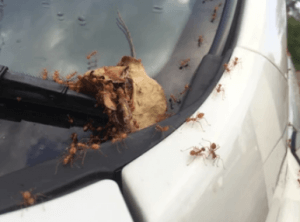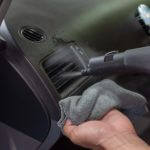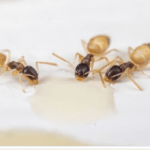
Spotting a trail of ants in your car can be alarming and frightening. However, it’s important to note that ants permanently settling in your vehicle is uncommon.
One main thing that attracts ants was because of food. They return to their colony with it. If there isn’t any food in your car, the ants most likely leave because their quest was futile. Your automobile will become the ant nest’s hub once the food is discovered by these tiny little workers, especially if it comes to a halt.
Remove any food that has fallen to the ground board that may attract ants. That’s one of the fastest ways to get rid of them. Avoid eating inside your car. As if we know, their ability was great when it comes to smelling something. Smelling is their only way to set up their trail to hunt foods. Maybe our car wouldn’t have leftover foods, but what’s stored inside? The smell of the food. Ants will still enter the area where they smell it.
Make sure you’ve parked your automobile away from ants’ hill.
Ants in Car Vent
Air conditioners are prone to sweating. The car air vents are no exception to that. Vents start beading up with water and dripping when the humidity is too high. Usually, water sources inside the car were water moist. Any signs of food can cause a big colony to take over your vehicle. Another item that attracts ants is water. Water, as we all know, is necessary for life.
Their main intention is to garner what they only need to survive living. It may also attract them. If there is a spill of water in the car, a swarm of ants will descend to collect the liquid. Because of water moisture found on seats, the molds and fungi, which can grow on foams and other parts like the upholstery, are a food source for some ants. Because dampness and humidity can promote the growth of these fungi, you should air your car periodically, even if you are not driving it. Or else, use it regularly to disturb them and stop them from doing what they want to do inside your car.
Ants in a Car Engine
If the engine is in good functioning order, the chances of having ants are minimal. Because a car’s engine is sealed and covered, and still, ants can sneak into the crevices of your engine compartment, as well as particular elements like your air filter. Just treat it as if it were also an infestation of ants in your home.
You have ants in your car, mainly because you’ve attracted them by your food or waste found inside. If you see ants near your engine, spray through the front grill (not directly) and get your automobile inspected by a mechanic. It’s more likely to become an ant colony if it has been in the garage for so long.
So, if your vehicle hasn’t been started or utilized in a long time, it is advisable to check the engine bay. Do some simple checkups of your car once a week. It may be so laborious, at least you saved your car from internal damage. One more thing, conducting checkups may lessen the cost of your maintenance and prevent obsolescence of the vehicle.
Ants in a Car Dashboard
A dashboard is a control panel. It is situated right before the driver and displays car instrumentation and controls. Indeed, finding ants in your car or ants crawling through your dashboard is disgusting and destructive.
There are just two possibilities.
First, they enter to look for food. Second, the ants discovered a source of food. And since the air vents are a source of moisture and are part of the control panel. It will inevitably be the second to be accessed immediately by the ant. Park. Design your parking lot or garage away from the kitchen.
Many ants prefer to build their nests near a water source. Water leakage could be the main factor in them choosing your car as a home. Make sure to repair the leak inside the car as soon as possible it may, before any other probable causes may happen next.
Best ant bomb and ant traps for the car
For automotive use, Raid Concentrated Deep Reach Fogger is excellent. It not only kills all ants inside the vehicle, but it also kills ants that enter the vehicle for up to two months after the first usage. This chemical, sometimes known as a bug bomb, penetrates every crack of the car to kill those ants and even ants that enter the automobile for several months.
They’re fantastic at getting rid of ant infestations. However, keep in mind, the way it contaminates the car with insecticide, you will have to “live” with the residues on it every time you get in it. These residues can be harmful, or at the very least smelly and unpleasant, depending on the insecticide.
Don’t rely too much on bombs and traps for ants. It contains chemicals that are bad for human health. Instead, do the safe and simple way to get rid of the ant in your car. Install some DIY fresheners. One example was the scent of lemongrass. It has a significant insect repellent effect that may prevent most of the ants from entering.
How to prevent ants from infesting your car?
It would seem that getting rid of the food and the ants in your car would be a good idea. However, if ants have gained access to your vehicle, removing the food source may be difficult. But here are some tips to prevent ants from infesting your car.
If your car is messy, you should clean it up to avoid an ant infestation. Any signs of food can cause a big colony to take over your vehicle.
To get rid of them or prevent them, wash and vacuum the interior of your car. Washing car every two weeks is essential. Obsessives will do it at least once a week. It may not only remove insects. It may also avoid damage to the paint and metal from irregular dirt like road salt and bug guts. Drive it from time to time, be cautious of where you park (away from vegetation), and, if necessary, use ant baits and pesticides.
But don’t rely on chemical insect remover.


